
Gustave Caillebotte Painting Reproductions 1 of 4
1848-1894
French Impressionist Painter
Gustave Caillebotte (August 19, 1848 - February 21, 1894), was a French painter, member and patron of the group of artists known as Impressionists, stamp collector, and yacht engineer.
Gustave Caillebotte was born on August 19, 1848 to an upper-class Parisian family. His father, Martial Caillebotte (1799-1874), was the inheritor of the family's textile industry and was also a judge at the Seine's Tribunal de Commerce. Caillebotte's father had been twice widowed before marrying Caillebotte's mother, Celeste Daufresne (1819-1878), who had two more sons after Gustave, Rene (1851-1876) and Martial (1853-1910).
Caillebotte was born at his family's home on rue du Faubourg-Saint-Denis in Paris, and lived on that street until 1866 when his father had a home built on rue de Miromesnil in Paris. The Caillebottes began spending many of their summers in Yerres, a town on the Yerres River about 12 miles south of Paris, in 1860, when Martial Caillebotte, Sr. bought a large property there. It was around this time that Caillebotte probably began to draw and paint. Many of Caillebotte's paintings depict members of his family and daily domestic life; Young Man at His Window, 1875, shows Rene in the home on rue de Miromesnil, The Orange Trees, 1878, depicts Martial Jr. and his cousin Zoe in the garden of the family property at Yerres, and Portraits in the Country, 1875, includes Caillebotte's mother along with his aunt, cousin, and a family friend.
Caillebotte earned a law degree in 1868 and a license to practice law in 1870. Shortly afterwards, he was drafted to fight in the Franco-Prussian war, and served in the Garde Mationale Mobile de la Seine. After the war, Caillebotte began visiting the studio of painter Leon Bonnat, where he began to seriously study painting. In 1873, Caillebotte entered into the Ecole des Beaux-Arts, but apparently did not spend much time there. Around this time, Caillebotte met and befriended several artists working outside the official French academy, including Edgar Degas and Giuseppe de Nittis, and attended (but did not participate in) the first Impressionist exhibition of 1874.
Caillebotte's sizable allowance and the inheritance he received after the death of his father in 1874 and his mother in 1878 allowed him to paint without the pressure to sell his work. It also allowed him to help fund Impressionist Exhibitions and support his fellow artists and friends (including Claude Monet, Auguste Renoir, and Camille Pissarro among others) by purchasing their works and, at least in the case of Monet, paying the rent for their studios. In addition, Caillebotte used his wealth to fund a variety of hobbies for which he was quite passionate, including stamp collecting (his collection is now in the British Museum), orchid horticulture, yacht building, and even textile design (the women in his paintings Madame Boissiere Knitting, 1877, and Portrait of Madame Caillebotte, 1877, may be working on patterns created by Caillebotte).
Caillebotte's style belongs to the school of Realism. As did his predecessors Jean-Francois Millet and Gustave Courbet, as well his contemporary Degas, Caillebotte aimed to paint reality as it existed and as he saw it, hoping to reduce painting's inherent theatricality. He also shared the Impressionists' commitment to optical truth. Caillebotte painted many domestic, familial scenes, interiors, and figures in a landscape at Yerres, but he is most well known for his paintings of urban Paris, such as The Floor Scrapers, 1875, Le pont de l'Europe, 1876, and Paris Street, Rainy Day, 1877. These paintings were quite controversial for their banal and often lower-class subjects, and for their exaggerated, plunging perspective. The tilted ground common to these paintings is very characteristic of Caillebotte's work, which may have been strongly influenced by Japanese prints and the new technology of photography. Cropping and "zooming in," techniques which are also commonly found in Caillebotte's oeuvre, may also be the result of his interest in photography. A large number of Caillebotte's works also employ a very high vantage point, including his many balcony paintings such as Vue des toits, effet de neige, 1878 and Boulevard vu d'en haut, 1880.
Caillebotte's painting career slowed dramatically in the 1890s, when he stopped making large canvases and showing his work. He acquired a property at Petit Gennevilliers, on the banks of the Seine near Argenteuil, in 1881, and moved there permanently in 1888. He devoted himself to gardening and to building and racing yachts, and spent much time with his brother, Martial, and his friend Renoir, who often came to stay at Petit Gennevilliers. It is alleged by many sources that before his death, he had an affair with a much younger woman, Emilie Schlauch, but this can not be confirmed or denied based on the historical evidence that has been left to us. Caillebotte died while working in his garden at Petit Gennevilliers in 1894 of pulmonary congestion, and was interred in the Pere Lachaise Cemetery in Paris.
For many years, Caillebotte's reputation as a painter was superseded by his reputation as a supporter of the arts. Seventy years after his death, however, art historians began reevaluating his artistic contributions.
Caillebotte's Collection
In his will, Caillebotte donated a large collection to the French government. This collection included sixty-eight paintings by various artists: Camille Pissarro (nineteen), Claude Monet (fourteen), Pierre-Auguste Renoir (ten), Alfred Sisley (nine), Edgar Degas (seven), Paul Cezanne (five), and Edouard Manet (four).
At the time of Caillebotte's death, the Impressionists were still largely condemned by the art establishment in France, which was dominated by Academic art and specifically the Academie des beaux-arts. Because of this, Caillebotte realised that the cultural treasures in his collection would likely disappear into "attics" and "provincial museums". He therefore stipulated that they must be displayed in the Luxembourg Palace (devoted to the work of living artists), and then in the Louvre.
Unfortunately, the French government would not agree to these terms. In February 1896, they finally negotiated terms with Renoir, who was the will's executor, under which they took thirty-eight of the paintings to the Luxembourg. The remaining twenty-nine paintings (one was taken by Renoir in payment for his services as executor) were offered to the French government twice more, in 1904 and 1908, and were both times refused. When the government finally attempted to claim them in 1928, the bequest was repudiated by the widow of Caillebotte's son. Most of the remaining works were purchased by Albert C. Barnes, and are now held by the Barnes Foundation of Philadelphia.
Forty of Caillebotte's own works are now held by the Musee d'Orsay. His L'Homme au balcon, boulevard Haussmann, painted in 1880, sold for more than $14.3 million in 2000.
Gustave Caillebotte was born on August 19, 1848 to an upper-class Parisian family. His father, Martial Caillebotte (1799-1874), was the inheritor of the family's textile industry and was also a judge at the Seine's Tribunal de Commerce. Caillebotte's father had been twice widowed before marrying Caillebotte's mother, Celeste Daufresne (1819-1878), who had two more sons after Gustave, Rene (1851-1876) and Martial (1853-1910).
Caillebotte was born at his family's home on rue du Faubourg-Saint-Denis in Paris, and lived on that street until 1866 when his father had a home built on rue de Miromesnil in Paris. The Caillebottes began spending many of their summers in Yerres, a town on the Yerres River about 12 miles south of Paris, in 1860, when Martial Caillebotte, Sr. bought a large property there. It was around this time that Caillebotte probably began to draw and paint. Many of Caillebotte's paintings depict members of his family and daily domestic life; Young Man at His Window, 1875, shows Rene in the home on rue de Miromesnil, The Orange Trees, 1878, depicts Martial Jr. and his cousin Zoe in the garden of the family property at Yerres, and Portraits in the Country, 1875, includes Caillebotte's mother along with his aunt, cousin, and a family friend.
Caillebotte earned a law degree in 1868 and a license to practice law in 1870. Shortly afterwards, he was drafted to fight in the Franco-Prussian war, and served in the Garde Mationale Mobile de la Seine. After the war, Caillebotte began visiting the studio of painter Leon Bonnat, where he began to seriously study painting. In 1873, Caillebotte entered into the Ecole des Beaux-Arts, but apparently did not spend much time there. Around this time, Caillebotte met and befriended several artists working outside the official French academy, including Edgar Degas and Giuseppe de Nittis, and attended (but did not participate in) the first Impressionist exhibition of 1874.
Caillebotte's sizable allowance and the inheritance he received after the death of his father in 1874 and his mother in 1878 allowed him to paint without the pressure to sell his work. It also allowed him to help fund Impressionist Exhibitions and support his fellow artists and friends (including Claude Monet, Auguste Renoir, and Camille Pissarro among others) by purchasing their works and, at least in the case of Monet, paying the rent for their studios. In addition, Caillebotte used his wealth to fund a variety of hobbies for which he was quite passionate, including stamp collecting (his collection is now in the British Museum), orchid horticulture, yacht building, and even textile design (the women in his paintings Madame Boissiere Knitting, 1877, and Portrait of Madame Caillebotte, 1877, may be working on patterns created by Caillebotte).
Caillebotte's style belongs to the school of Realism. As did his predecessors Jean-Francois Millet and Gustave Courbet, as well his contemporary Degas, Caillebotte aimed to paint reality as it existed and as he saw it, hoping to reduce painting's inherent theatricality. He also shared the Impressionists' commitment to optical truth. Caillebotte painted many domestic, familial scenes, interiors, and figures in a landscape at Yerres, but he is most well known for his paintings of urban Paris, such as The Floor Scrapers, 1875, Le pont de l'Europe, 1876, and Paris Street, Rainy Day, 1877. These paintings were quite controversial for their banal and often lower-class subjects, and for their exaggerated, plunging perspective. The tilted ground common to these paintings is very characteristic of Caillebotte's work, which may have been strongly influenced by Japanese prints and the new technology of photography. Cropping and "zooming in," techniques which are also commonly found in Caillebotte's oeuvre, may also be the result of his interest in photography. A large number of Caillebotte's works also employ a very high vantage point, including his many balcony paintings such as Vue des toits, effet de neige, 1878 and Boulevard vu d'en haut, 1880.
Caillebotte's painting career slowed dramatically in the 1890s, when he stopped making large canvases and showing his work. He acquired a property at Petit Gennevilliers, on the banks of the Seine near Argenteuil, in 1881, and moved there permanently in 1888. He devoted himself to gardening and to building and racing yachts, and spent much time with his brother, Martial, and his friend Renoir, who often came to stay at Petit Gennevilliers. It is alleged by many sources that before his death, he had an affair with a much younger woman, Emilie Schlauch, but this can not be confirmed or denied based on the historical evidence that has been left to us. Caillebotte died while working in his garden at Petit Gennevilliers in 1894 of pulmonary congestion, and was interred in the Pere Lachaise Cemetery in Paris.
For many years, Caillebotte's reputation as a painter was superseded by his reputation as a supporter of the arts. Seventy years after his death, however, art historians began reevaluating his artistic contributions.
Caillebotte's Collection
In his will, Caillebotte donated a large collection to the French government. This collection included sixty-eight paintings by various artists: Camille Pissarro (nineteen), Claude Monet (fourteen), Pierre-Auguste Renoir (ten), Alfred Sisley (nine), Edgar Degas (seven), Paul Cezanne (five), and Edouard Manet (four).
At the time of Caillebotte's death, the Impressionists were still largely condemned by the art establishment in France, which was dominated by Academic art and specifically the Academie des beaux-arts. Because of this, Caillebotte realised that the cultural treasures in his collection would likely disappear into "attics" and "provincial museums". He therefore stipulated that they must be displayed in the Luxembourg Palace (devoted to the work of living artists), and then in the Louvre.
Unfortunately, the French government would not agree to these terms. In February 1896, they finally negotiated terms with Renoir, who was the will's executor, under which they took thirty-eight of the paintings to the Luxembourg. The remaining twenty-nine paintings (one was taken by Renoir in payment for his services as executor) were offered to the French government twice more, in 1904 and 1908, and were both times refused. When the government finally attempted to claim them in 1928, the bequest was repudiated by the widow of Caillebotte's son. Most of the remaining works were purchased by Albert C. Barnes, and are now held by the Barnes Foundation of Philadelphia.
Forty of Caillebotte's own works are now held by the Musee d'Orsay. His L'Homme au balcon, boulevard Haussmann, painted in 1880, sold for more than $14.3 million in 2000.
89 Caillebotte Paintings
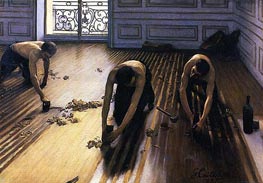
The Floor Scrapers 1875
Oil Painting
$882
$882
Canvas Print
$58.09
$58.09
SKU: GUC-498
Gustave Caillebotte
Original Size: 102 x 146 cm
Musee d'Orsay, Paris, France
Gustave Caillebotte
Original Size: 102 x 146 cm
Musee d'Orsay, Paris, France
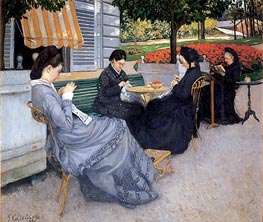
Portraits in the Countryside 1876
Oil Painting
$827
$827
Canvas Print
$116.18
$116.18
SKU: GUC-499
Gustave Caillebotte
Original Size: unknown
Musee Baron Garerd, Bayeux, France
Gustave Caillebotte
Original Size: unknown
Musee Baron Garerd, Bayeux, France
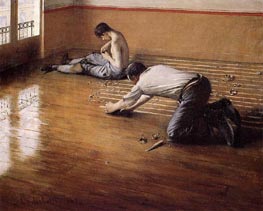
The Floor Scrapers (variation) 1876
Oil Painting
$894
$894
SKU: GUC-500
Gustave Caillebotte
Original Size: unknown
Private Collection
Gustave Caillebotte
Original Size: unknown
Private Collection
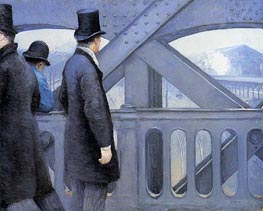
The Pont de Europe c.1876/77
Oil Painting
$882
$882
Canvas Print
$66.22
$66.22
SKU: GUC-501
Gustave Caillebotte
Original Size: 105.7 x 130.8 cm
Kimbell Art Museum, Fort Worth, USA
Gustave Caillebotte
Original Size: 105.7 x 130.8 cm
Kimbell Art Museum, Fort Worth, USA
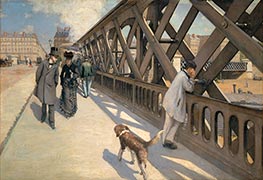
The Pont de Europe 1876
Oil Painting
$1224
$1224
Canvas Print
$57.20
$57.20
SKU: GUC-502
Gustave Caillebotte
Original Size: 124.8 x 180.7 cm
Petit Palais Musee des Beaux Arts, Paris, France
Gustave Caillebotte
Original Size: 124.8 x 180.7 cm
Petit Palais Musee des Beaux Arts, Paris, France
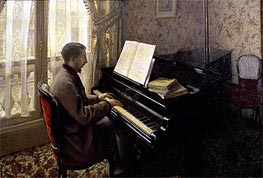
Young Man Playing the Piano 1876
Oil Painting
$1103
$1103
Canvas Print
$57.34
$57.34
SKU: GUC-503
Gustave Caillebotte
Original Size: 80 x 116 cm
Bridgestone Museum of Art, Tokyo, Japan
Gustave Caillebotte
Original Size: 80 x 116 cm
Bridgestone Museum of Art, Tokyo, Japan
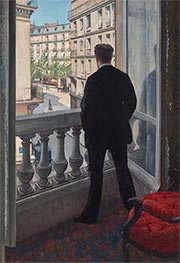
Young Man at His Window 1876
Oil Painting
$1096
$1096
Canvas Print
$56.59
$56.59
SKU: GUC-504
Gustave Caillebotte
Original Size: 116 x 81 cm
Private Collection
Gustave Caillebotte
Original Size: 116 x 81 cm
Private Collection
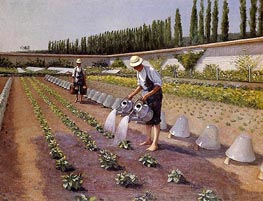
The Gardeners c.1875/77
Oil Painting
$894
$894
SKU: GUC-505
Gustave Caillebotte
Original Size: unknown
Private Collection
Gustave Caillebotte
Original Size: unknown
Private Collection
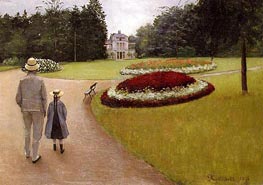
The Park on the Caillebotte Property at Yerres 1875
Oil Painting
$870
$870
SKU: GUC-506
Gustave Caillebotte
Original Size: unknown
Private Collection
Gustave Caillebotte
Original Size: unknown
Private Collection
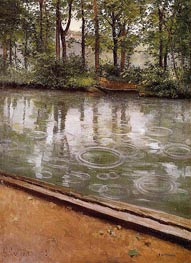
The Yerres, Rain (Riverbank in the Rain) 1875
Oil Painting
$735
$735
SKU: GUC-507
Gustave Caillebotte
Original Size: unknown
Indiana University Art Museum, Bloomington, USA
Gustave Caillebotte
Original Size: unknown
Indiana University Art Museum, Bloomington, USA
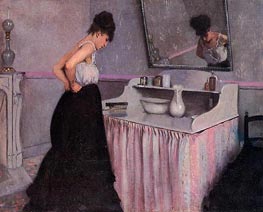
Woman at a Dressing Table c.1873
Oil Painting
$882
$882
SKU: GUC-508
Gustave Caillebotte
Original Size: unknown
Private Collection
Gustave Caillebotte
Original Size: unknown
Private Collection
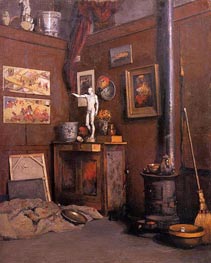
Interior of a Studio with Stove c.1872/74
Oil Painting
$812
$812
SKU: GUC-509
Gustave Caillebotte
Original Size: unknown
Private Collection
Gustave Caillebotte
Original Size: unknown
Private Collection
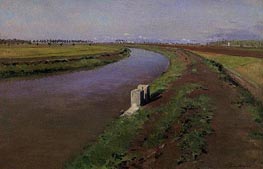
The Banks of a Canal, mear Naples c.1892
Oil Painting
$561
$561
SKU: GUC-510
Gustave Caillebotte
Original Size: unknown
Private Collection
Gustave Caillebotte
Original Size: unknown
Private Collection
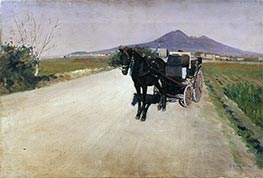
A Road near Naples 1872
Oil Painting
$588
$588
Canvas Print
$55.84
$55.84
SKU: GUC-511
Gustave Caillebotte
Original Size: 40 x 60 cm
Private Collection
Gustave Caillebotte
Original Size: 40 x 60 cm
Private Collection
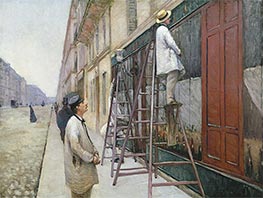
The House Painters 1877
Oil Painting
$990
$990
Canvas Print
$62.32
$62.32
SKU: GUC-512
Gustave Caillebotte
Original Size: 87 x 116 cm
Private Collection
Gustave Caillebotte
Original Size: 87 x 116 cm
Private Collection
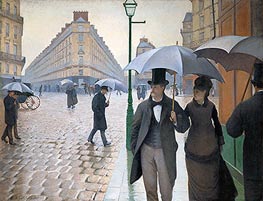
Paris Street; Rainy Weather 1877
Oil Painting
$1565
$1565
Canvas Print
$62.92
$62.92
SKU: GUC-513
Gustave Caillebotte
Original Size: 212.2 x 276.2 cm
Art Institute of Chicago, Illinois, USA
Gustave Caillebotte
Original Size: 212.2 x 276.2 cm
Art Institute of Chicago, Illinois, USA
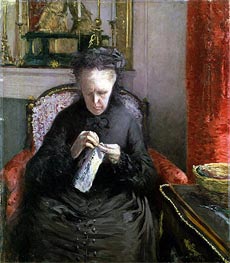
Portrait of Madame Martial Caillebotte 1877
Oil Painting
$882
$882
Canvas Print
$88.81
$88.81
SKU: GUC-514
Gustave Caillebotte
Original Size: 83 x 72 cm
Private Collection
Gustave Caillebotte
Original Size: 83 x 72 cm
Private Collection
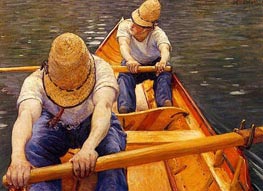
Oarsmen 1877
Oil Painting
$882
$882
SKU: GUC-515
Gustave Caillebotte
Original Size: unknown
Private Collection
Gustave Caillebotte
Original Size: unknown
Private Collection
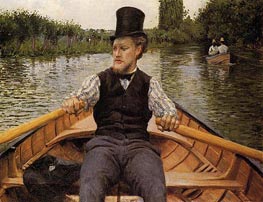
Boating Party 1877
Oil Painting
$907
$907
SKU: GUC-516
Gustave Caillebotte
Original Size: unknown
Private Collection
Gustave Caillebotte
Original Size: unknown
Private Collection
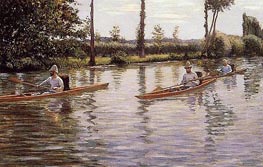
Perissoires 1877
Oil Painting
$572
$572
SKU: GUC-517
Gustave Caillebotte
Original Size: unknown
Milwaukee Art Museum, Wisconsin, USA
Gustave Caillebotte
Original Size: unknown
Milwaukee Art Museum, Wisconsin, USA
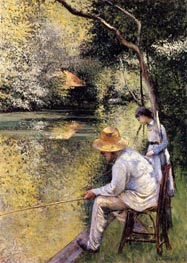
Fishing 1878
Oil Painting
$870
$870
SKU: GUC-518
Gustave Caillebotte
Original Size: unknown
Private Collection
Gustave Caillebotte
Original Size: unknown
Private Collection
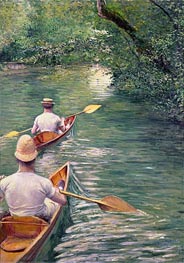
Perissoires (The Canoes) 1878
Oil Painting
$882
$882
Canvas Print
$71.12
$71.12
SKU: GUC-519
Gustave Caillebotte
Original Size: 155 x 108.5 cm
Musee des Beaux Arts, Rennes, France
Gustave Caillebotte
Original Size: 155 x 108.5 cm
Musee des Beaux Arts, Rennes, France
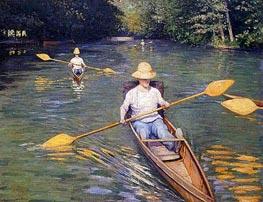
Skiffs 1877
Oil Painting
$810
$810
Canvas Print
$62.92
$62.92
SKU: GUC-520
Gustave Caillebotte
Original Size: 89 x 116.2 cm
National Gallery of Art, Washington, USA
Gustave Caillebotte
Original Size: 89 x 116.2 cm
National Gallery of Art, Washington, USA
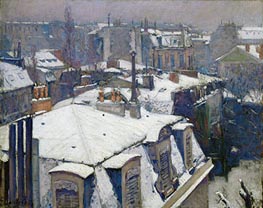
View of Roofs (Snow Effect) 1878
Oil Painting
$894
$894
Canvas Print
$65.33
$65.33
SKU: GUC-521
Gustave Caillebotte
Original Size: 64 x 82 cm
Musee d'Orsay, Paris, France
Gustave Caillebotte
Original Size: 64 x 82 cm
Musee d'Orsay, Paris, France